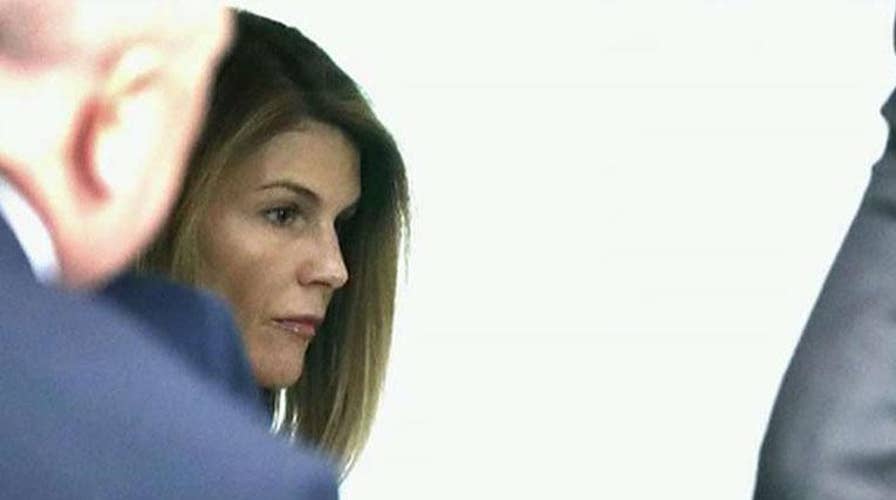New charges announced against 11 parents in college admissions scam
Prosecutors file additional charges against 11 parents in the college admissions scandal, including actress Lori Loughlin and her husband. Fox News senior judicial analyst Judge Andrew Napolitano reacts.
“I know I shouldn’t be a helicopter parent … but it just feels right to me.”
Those were the words a mother uttered to me following a parent event. I had just spoken on the damages that over-functioning parenting styles can cause to kids. She had just heard the data on how today’s parents often risk too little, rescue too quickly and rave too easily.
For the record, this new parenting style began decades ago when we decided to negotiate our children’s grades in school; to do our kids’ homework for them over a latte, and to give them trophies just for showing up.
COLLEGE ADMISSIONS SCANDAL: MARKETING CEO GETS 3 WEEKS FOR CHEATING ON SON'S ACT EXAM
Over the years, it seems the helicopter parent has become an Apache helicopter.
More from Opinion
As evidence, I submit to you this year’s college admissions scandal – a conspiracy where parents paid bribes to insure their children got into their college of choice. More than 50 people have been charged in the scandal, accused of paying over $25 million between 2011 and 2018. False documents were submitted; SAT scores were adjusted and money was laundered.
Celebrities involved in the scandal include “Full House” actress Lori Loughlin and her fashion designer husband Mossimo Giannulli, who have pleaded not guilty. Actress Felicity Huffman pleaded guilty and is currently serving a 14-day jail sentence and was ordered to also perform 250 hours of community service and pay a $30,000 fine.
LORI LOUGHLIN, MOSSIMO GIANNULLI INDICTED ON NEW FEDERAL CHARGES IN COLLEGE ADMISSIONS SCANDAL
The scandal is a case study of the leadership style too many parents of Generation Z children have embraced. These parents have decided to play a more intrusive role in the lives and futures of their children. While most parents may not stoop to illegal activity, they’ve felt the need to prepare the path for the child instead of the child for the path.
I began wondering how this kind of leadership style has impacted our kids.
Our non-profit, Growing Leaders, and the Harris Poll surveyed more than 2,000 adults across America, from a variety of demographics to find out how they felt about Generation Z, the youngest population growing up today.
What we discovered confirmed my hunch. Some 66 percent of American adults have a negative emotion first when they think of kids today.
In other words, the first thing we feel is pessimism, not optimism. Before belief we feel frustration. Before hope we feel fear for them. And 64 percent of us do not believe today’s kids will be ready for adulthood in time.
This fear narrative drives us to be intrusive, especially when we feel our kid won’t be able to negotiate life for themselves. It even leads some parents to cheat to get their kids into college. And it’s had a negative net effect on how teenagers approach life.
As I reviewed how we got here, I discovered the research from Dr. Julian Rotter in 1954. Rotter created a scale to determine whether students were developing an “external locus of control” or an “internal locus of control.” Simply defined, here is the difference:
Internal Locus of Control – People who believe that they are responsible and in control of their own success.
External Locus of Control – People who believe that fate or external forces somehow determine their success.
After nine years of study, Rotter’s conclusions were that students with an “internal locus” became far more successful in life, taking better care of their health, careers and families. It makes sense. They believe they’re responsible for the outcomes.
As I reviewed the last five decades, I saw a steady rise in “external locus of control” among students.
Since 2002, U.S. kids have experienced a steep rise in this “external locus.” More of them feel their lives are out of their control.
Dr. Peter Gray, of Boston College, writes: “In fact, the shift has been so great that the average young person in 2002 was more External than were 80% of young people in the 1960s. The rise in Externality on Rotter’s scale over the 42-year period showed the same linear trend as did the rise in depression and anxiety.”
Reflect for a moment. In “Generation Z Unfiltered,” I pose the question: How do you suppose feeling “out of control of my life” affects a teen? Don’t you feel a little more anxious when someone else is in control of your life?
CLICK HERE TO SIGN UP FOR OUR OPINION NEWSLETTER
When kids enter their teenage years, their brains are developing significantly, desiring to take more risks; they naturally yearn for more autonomy and responsibility. It’s how we all get ready for healthy adulthood.
When we don’t equip our children to take on that independence, life gets unhealthy. We must begin to offer our kids a greater sense of ownership by believing in them and their ability to achieve on their own.
When Felicity Huffman was sentenced for her part in the college admissions scandal, she said she felt ashamed and embarrassed. Yet, in an interview she confessed that her sentencing wasn’t the worst part of the ordeal.
CLICK HERE TO GET THE FOX NEWS APP
Huffman said the worst part was facing her daughter, who said with tears in her eyes: “Why didn’t you believe in me? Why didn’t you think I could do it on my own?”
May we never have a teen say those words to any of us.









































